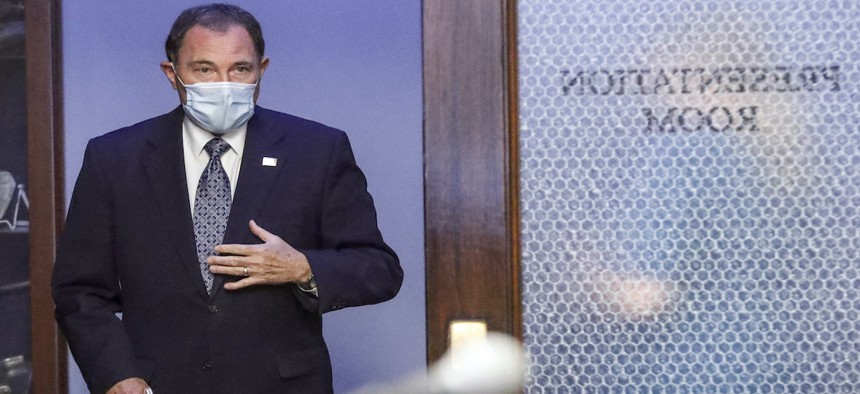One State is Manufacturing Free Masks for Any Resident Who Wants One

Utah Gov. Gary Herbert wears a mask as he waits in the hallway before the start of the daily briefing on the state's efforts to fight Covid-19 Wednesday, June 24, 2020, in Salt Lake City. Associated Press
Since April, the state of Utah and area manufacturers have supplied more than 1 million masks to state residents for free.
Masks aren’t mandatory in most public places in Utah. But Gov. Gary Herbert’s administration encourages people to wear them—and, since April, has provided more than a million masks to residents for free, courtesy of a public-private partnership between the state and area manufacturers.
The “Mask For Every Utahn” project, a collaboration between the Governor’s Office of Economic Development and the Utah Manufacturers Association, allows interested manufacturers to repurpose their facilities to make cloth masks for residents. The masks are washable and reusable, but are not medical-grade, and are provided and shipped for free to any state resident who requests one.
The idea came at the start of the pandemic, when personal protective equipment was particularly hard to come by, said Ben Hart, deputy director of the economic development office.
“We had a shortage of just about everything, and we needed to be very active in creating a mask program to provide masks for our citizens,” he said. “We allowed any manufacturer who wanted to be a part of this process to join, and they have been working around the clock to get these masks produced and delivered.”
Several dozen in-state manufacturers answered the call, including Coleman Knitting Mills, an Ogden-based company that makes letter jackets, cheerleading apparel and club sweaters. The state also partnered directly with Cotopaxi, an outdoor-apparel company, and H.M. Cole, a men’s apparel store, to produce masks at manufacturing facilities worldwide. Both businesses are based in Salt Lake City.
So far, about 2.3 million masks have been produced; 1.25 million of them inside Utah, creating or saving a total of 300 jobs, the state reports. Masks cover the nose and mouth and are produced at an affordable price, verified by the Utah Manufacturers Association, which serves as a go-between for the state and the individual facilities. To fund the project, the state tapped $11 million of its share of federal CARES Act money.
Any resident can request masks online, though the state particularly encourages orders from people who don’t already have masks and aren’t able to make or buy them. The state accepts single orders and will also send “upon request, once, and free of charge, up to six masks to each Utah mailing address.” So far, the department has fielded nearly 300,000 orders for about 1.1 million masks. Nearly all of them have been filled, Hart said.
“We’ve got about 3 million residents in the state of Utah, so we have already filled orders to a third of our state residents,” he said. “It really has been a tremendous effort, and it’s cool to have been a part of it, but it’s also cool to be walking down the streets of Salt Lake City or even going to church here locally and see people wearing these masks.”
The masks are gender-neutral and one-size-fits-all, though some designers have added extra flair, including images of Utah national parks. At least one resident also received masks printed with an American flag, a handgun and the phrase “Don’t Tread On Me,” which were deemed “inappropriate” by state staffers and replaced for free. No taxpayer money will be used to pay for those, Hart told a local television station.
The program will likely run through at least the summer, along with a $1 million education initiative to encourage “healthy activity” throughout the pandemic, including wearing masks and adhering to public health guidelines.
Some mandatory mask policies may follow. Herbert, a Republican, has repeatedly urged state residents to wear masks and this week signed an executive order requiring their use in all state buildings, including state-run liquor stores. But he’s thus far avoided statewide mandates, saying at a press conference Wednesday that “the heavy hand of government sometimes has a negative reaction with the people.”
But he hasn’t ruled it out, and agreed to review a request from Salt Lake County’s mayor to enforce a mandatory mask policy there.
“I believe in a bottom-up approach rather than a top-down,” Herbert said. “I think those people closest to those people on the ground probably know what is in their best interest.”
The request comes as coronavirus cases continue to surge in Utah. The state announced 591 new cases of the virus on Thursday, up from 484 new cases the day before.
Kate Elizabeth Queram is a staff correspondent with Route Fifty and is based in Washington, D.C.
NEXT STORY: Saharan Dust Sweeps Into Gulf Coast Region





